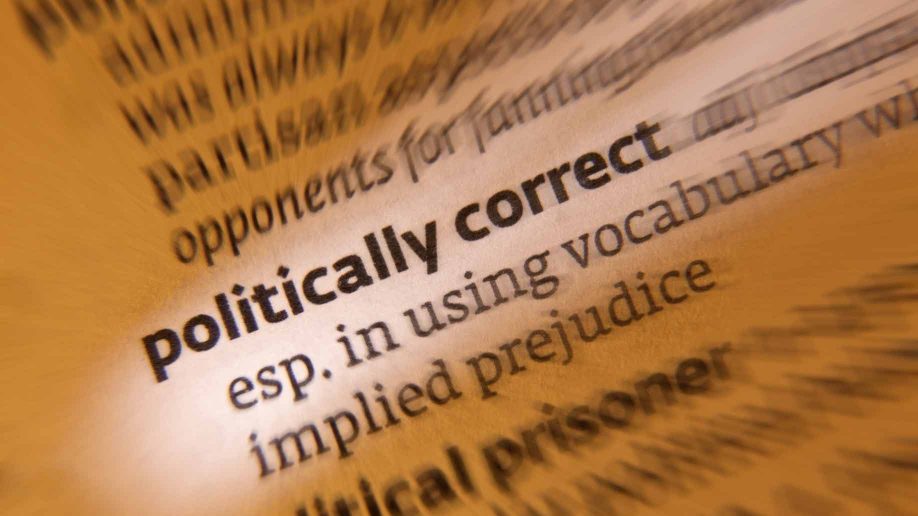
“Sticks and stones may break my bones, but words will never hurt me.” This old English rhyme is often heard during one’s childhood, typically as comfort to a victim of ridicule by other children. Implicit in the advice is the unspoken admonition to the child to grow up and ignore the pain of verbal abuse – after all, it’s only words.
Many believe that the avoidance of words that may offend, marginalize, or insult a group of people – political correctness (PC) – has gone too far. According to PC critics, PC promotes a society of victimhood and endangers the public at large by limiting discussion about controversial subjects. Chris Cox, the executive director of the NRA Institute for Legislative Action, wrote in a USA Today op-ed about the Orlando mass shootings that the “administration’s political correctness prevented anything from being done about it.”
Conservatives claim that PC is a threat to the first amendment and our right to free speech. Columnists liken modern-day America to Ray Bradbury’s “Fahrenheit 451” or George Orwell’s future society in “1984“. In “1984”, Big Brother’s thought police relentlessly pursue anyone foolish enough to say anything that might be offensive to someone. Surprisingly, liberals – often blamed for the expansion of PC – have their own misgivings about verbal censorship. Ralph Nader, a former third-party candidate for president, says, “You can’t say this about that, and you can’t say that about this. And the employer tells you to hush. And perhaps your wife tells you to hush, and your kids tell you to hush. It’s gotten absurd.”
Does one’s choice of words matter? Have efforts to avoid offense stifled free speech as many claim? Is political correctness an expression of politeness, evasion of hard truths, or extreme sensitivity? Or is an expression of anti-PC sentiment simply incivility, indecency, or vulgarity, as Mark Hanna writes in TIME?
Read more . . .
1 Way to Fix the U.S. Federal Debt No One is Talking About
Read more . . .
Public lotteries have a long history. From Caesar Augustus (where tickets had prizes of slaves, real estate, and ships) to European governments during the Middle Ages (which relied heavily on lotteries for revenue), state-run lotteries have continually proven lucrative, according to the Encyclopedia Britannica.
Not surprisingly, the United States of America also has a long history of lotteries. Considered “voluntary taxes,” early lotteries were used to fund new colleges such as Harvard, Dartmouth, Yale, and Brown. In 1745, the General Court of Massachusetts passed an act allowing a lottery to pay off costs defending the colony’s frontier and seacoasts. By 1831, eight states held 420 lotteries.
Today, lotteries are the most popular form of gambling in the United States, with two times as many annual participants as those who visit a casino. A Gallup Research Poll indicates that nearly 50% of Americans buy state lottery tickets each year. The majority of participants have a technical, college or post-graduate degree, earning more than $36,000 a year.
The popularity of gambling has also been global, with numerous governments taking a cut. One of the longest-running lotteries was the Irish Sweepstakes from 1930 to 1987, the revenues of which benefited Ireland’s public hospitals. A state-run lottery managed by the country’s postal system replaced the Sweepstakes, providing more than £30 million for government-sponsored projects each week. According to the United Kingdom’s official National Lottery website, more than £1,901 million ($2.37 billion in U.S. dollars) has funded 500,000 projects since its origination in 1994.
According to the North American Association of State and Provincial Lotteries (NAASPL), more than $110 billion of lottery tickets were sold in the United States in 2015. Roughly $33 billion of that was redirected to state and local governments. According to figures compiled by the U.S. Treasury Department, that represents approximately one-tenth of the Federal Government’s annual revenues from corporate taxes ($344 billion) and slightly more than 2% of the $1.5 trillion received from individual income taxes.
With huge participation rates and billions in revenue, redirecting lottery funds can make a significant impact. As the national debt continues to rise, many have called for a national lottery, with proceeds spent paying down debt.
Is it time to offer a national lottery in the United States to retire the National Debt?
The Growing National Debt
According to the Federal Reserve Bank of St. Louis, the total U.S. national debt will be $20 trillion by the end of 2016, a 347% increase since 2000. Many economists consider only the debt held by the public in their calculations, discounting the effect of intra-government holdings (an estimated $5.5 trillion at the end of the year). The majority of the intra-governmental holdings are in the Medicare and Social Security Trust Funds, as well as the Federal Financing Bank securities.
Read more . . .
Joining the Military After High School – Benefits and Risks

Military service has long been a path for social and economic mobility – the gateway to the middle class – for thousands of young American men and women. Service is both a way to see the world and learn valuable skills that can be transferred into civilian life – and many enlistees would not have the opportunity to attend college or purchase a house without the benefits associated with military service. Furthermore, veterans who forego college are likely to earn higher pay than non-veterans who do the same. According to Jay Teachman, a sociology professor at Western Washington University, interviewed in The Fiscal Times, “Even if they [veterans] don’t earn more education, they certainly earn more money.”
The opportunity to learn responsibility, focus, and discipline from military service can benefit enlistees for life. People in the military are taught how to make decisions in extreme conditions and function in periods of stress – traits critical in civilian life. However, it is important to have a thorough understanding of the risks as well as the benefits of military service, and what the commitment to a career in the Armed Forces involves.
Military Experience and Success
Political Leaders
In addition to the financial benefits of military service, the training and experience it provides have enabled many to achieve high positions in politics and business. Since World War II, 10 of the United States’ 12 presidents have served in the country’s military. While the percentage of senators and representatives with military service has steadily declined since the 1970s, veterans continue to represent a significant portion of Congress. According to the Congressional Research Service, 73% in the 92nd Congress (1971 to 1972) had military experience, while 18.7% of the 114th Congress (2015 to 2016) were veterans.
Business Leaders
Executive offices of the country’s largest companies are full of military veterans. These include:
- Frederick W. Smith: The founder and CEO of FedEx served with the Marines in two tours of duty in Vietnam.
- Roger Staubach: Staubach, a former Heisman Trophy winner and founder of a national real estate firm, graduated from the U.S. Naval Academy and served two years in Vietnam.
- Alex Gorsky: The chairman and CEO of Johnson & Johnson graduated from the U.S. Military Academy and served six years in the U.S. Army.
According to a 2012 report by the Center for New American Security, companies are likely to pay higher starting salaries for employees with military service. The reasons cited for the employers’ preference include:
- Leadership and Teamwork Skills: Typically, veterans have led colleagues, accepted direction from others, and operated as part of a small team.
- Character: Veterans are perceived as being trustworthy, dependable, and drug-free, and having a strong work ethic.
- Structure and Discipline: Companies, especially those that emphasize safety, appreciate veterans’ experience following established procedures.
- Expertise: Companies value veterans’ technical skills, job-specific experiences, and understanding of the military community.
Entrepreneurs
Veterans are responsible for a significant percentage of start-up and small businesses using the experience and education provided during their service. According to Marianne Hudson writing in Forbes, 30% of all American businesses are owned by veterans. As a consequence, the National Veteran-Owned Business Association proudly proclaims, “The lessons learned and lived in military service like leadership, teamwork, competitive spirit, mission-orientation, and ambition are the same attributes needed to succeed in business.”
Read more . . .
How We Can Create and Keep Manufacturing Jobs in America
 The loss of American jobs has become a potent political issue. Politicians promise to reverse the trend of offshoring and to restore American workers to their previous position as the premier workforce in the world. Many tout new reshoring initiatives, claiming that jobs will return as wage differentials shrink, the quality of foreign goods falls, and shipping costs increase. Others propose new punitive legislation with penalties for moving jobs to foreign countries while erecting trade barriers to ensure that domestic products can compete with lower-priced foreign goods.
The loss of American jobs has become a potent political issue. Politicians promise to reverse the trend of offshoring and to restore American workers to their previous position as the premier workforce in the world. Many tout new reshoring initiatives, claiming that jobs will return as wage differentials shrink, the quality of foreign goods falls, and shipping costs increase. Others propose new punitive legislation with penalties for moving jobs to foreign countries while erecting trade barriers to ensure that domestic products can compete with lower-priced foreign goods.
Unfortunately, their promises are empty and fail to consider the underlying causes of offshoring, the probable consequences of trade barriers, or the increased pace of technology. In efforts to gain public favor, existing and wannabe office-holders vow to turn back the clock and return American manufacturing to its heyday in the 1950s. Simple, quick fixes for public consumption ignore the relentless expansion of globalization and the economic interdependence of world economies.
Manufacturing’s Role in the American Economy
According to the Center for American Progress, manufacturing is critical to the American economy, and its success or failure affects the economy as a whole, our national security, and the well-being of all Americans. In his book “Were You Born on the Wrong Continent?,” Thomas Geoghegan goes further, claiming without a strong industrial base, democracy dies.
According to Manufacturing.net, “Manufacturing was the primary reason for post-World War II growth of the middle class, and they are still inextricably linked today.” American manufacturing provided middle-class workers good paying jobs, and their factories were the main employers in American cities throughout the northeastern United States.
The area once referred to as the “Manufacturing Belt” or (“Factory Belt”) is now known as the “Rust Belt,” as job losses significantly impacted cities such as Detroit, Gary, Youngstown, Buffalo, and Toledo. Even companies whose names are synonymous with the towns and cities where they began (such as Hershey, Pennsylvania, and Kohler, Wisconsin) have offshored manufacturing jobs to the detriment of their communities. The collapse of the sector increased unemployment drastically in the forsaken communities, leading to urban decay, deteriorated services, and ghettos.
Read more . . .

